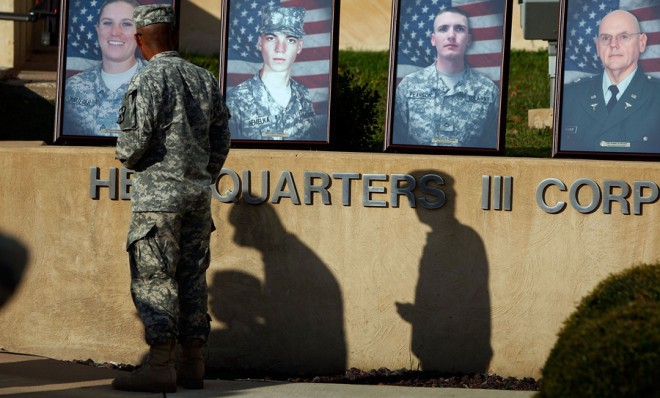Should Fort Hood shooter Nidal Hasan get the death penalty?
Everyone agrees on his guilt. His punishment is another matter.


A free daily email with the biggest news stories of the day – and the best features from TheWeek.com
You are now subscribed
Your newsletter sign-up was successful
A military jury on Friday found Maj. Nidal Hasan, a former Army psychiatrist, guilty of killing 13 fellow soldiers at Fort Hood, Texas, in 2009.
It took the 13-member panel of high-ranking officers just seven hours to reach the unanimous verdict. Hasan, a radicalized American-born Muslim who was bitter about his impending deployment to Afghanistan, admitted from the start that he had committed the massacre. He said the attack was justified to protect Taliban and other Islamist leaders from American forces in Afghanistan and Iraq.
The conviction didn't conclude the case entirely. The sentencing phase is set to begin on Monday, when the jury will decide whether to recommend if Hasan, 42, should be sent to prison for life, or become the first person the U.S. military has put to death in more than 50 years.
The Week
Escape your echo chamber. Get the facts behind the news, plus analysis from multiple perspectives.

Sign up for The Week's Free Newsletters
From our morning news briefing to a weekly Good News Newsletter, get the best of The Week delivered directly to your inbox.
From our morning news briefing to a weekly Good News Newsletter, get the best of The Week delivered directly to your inbox.
Under military law, anyone convicted on at least two counts of premeditated murder is eligible for the death penalty. Hasan was found guilty on 13 murder counts, as well as 32 charges of premeditated attempted murder for injuring 31 soldiers and shooting at another. Hasan's spree ended when a police officer shot him, leaving Hasan paralyzed from the waist down.
While the case was always seen as open and shut with respect to the question of Hasan's guilt, what happens next is less clear.
One obstacle to a death sentence is that all of the jurors must agree. If they don't, Hasan will probably wind up serving life in prison.
Furthermore, "death sentences are rare in the military and trigger automatic appeals that take decades to play out," say Will Weissert and Paul J. Weber at The Associated Press. "Among the final barriers to execution is authorization from the president."
A free daily email with the biggest news stories of the day – and the best features from TheWeek.com
Those hurdles might explain why no American soldier has been executed since 1961. Army Pvt. John A. Bennett was hanged that year after being convicted of the rape and attempted murder of an 11-year-old Austrian girl.
In Hasan's case, there are other factors to consider, and not just the fact that the number of Americans favoring the death penalty in general has declined in recent years to near its lowest point since capital punishment was reinstated in 1976.
Hasan dismissed his military-appointed lawyers, and defended himself in the trial. He cross-examined only a handful of the prosecution's parade of nearly 90 witnesses, and called none himself. He didn't make a closing statement, either. His military lawyers even tried, unsuccessfully, to get dropped as stand-in counsel because they believed Hasan was trying to help prosecutors win a death sentence.
There was evidence to suggest they were right. During the trial, Hasan leaked documents to journalists showing that he had told military mental health workers that even though he survived the rampage he could "still be a martyr" if executed.
That, says The Dallas Morning News in an editorial, is a strong argument for letting Hasan rot in prison. "Even with the heinousness of Hasan's crimes, this newspaper stands by its opposition to the death penalty," the Morning News says. "Tempting though it might be to argue for an exception for an Army major and psychiatrist who plotted to kill U.S. troops in cold blood, lethal injection would give this jihadist exactly what he wants."
Harold Maass is a contributing editor at The Week. He has been writing for The Week since the 2001 debut of the U.S. print edition and served as editor of TheWeek.com when it launched in 2008. Harold started his career as a newspaper reporter in South Florida and Haiti. He has previously worked for a variety of news outlets, including The Miami Herald, ABC News and Fox News, and for several years wrote a daily roundup of financial news for The Week and Yahoo Finance.
-
 Companies are increasingly AI washing
Companies are increasingly AI washingThe explainer Imaginary technology is taking jobs
-
 The 9 best steroid-free players who should be in the Baseball Hall of Fame
The 9 best steroid-free players who should be in the Baseball Hall of Famein depth These athletes’ exploits were both real and spectacular
-
 ‘Bad Bunny’s music feels inclusive and exclusive at the same time’
‘Bad Bunny’s music feels inclusive and exclusive at the same time’Instant Opinion Opinion, comment and editorials of the day
